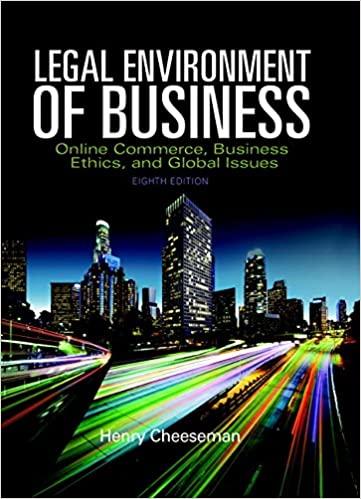Answered step by step
Verified Expert Solution
Question
1 Approved Answer
1. The sales force of the 21st century as compared to the sales force of earlier years will: a. include a lower number of workers
1. The sales force of the 21st century as compared to the sales force of earlier years will: a. include a lower number of workers b. contain a higher percentage of men c. be more ethnically diverse to reflect the demographic of the Canadian marker. d. be less productive than what exists today e. be less well trained than in previous decades 2. The person working in the Jewelry department at The Bay who helps you make a purchase decision, enters your order, takes your money, and hands you your jewelry would be classed as a/an: a. sales clerk b. sales engineer c. order getter d. service salesperson e. account representative 3. Aaron is a sales representative for a wholesale office supply company. It would NOT be part of his job to sell office supplies to: a. a final consumer b. the government c. a public relations agency d. a physicians' office that needs new file folders e. a hospital accounting department 4. A career in sales management usually begins with the position of: a. sales trainee or sales clerk b. salesperson c. sales representative d. key account salesperson e. assistant sales representative 5. To _____, salespeople must develop a personal, friendly, businesslike relationship with everyone who may influence a buying decision. a. provide service to customers b. help customers use products after purchase c. build goodwill with customers d. help customers resell products to their customers e. provide his or her company with market information 6. Any group within or outside an organization that has a stake in the organization's performance is called a/an: a. investor b. stakeholder c. proxy d. legal representative e. input provider 7. An organizational decision maker who acts with equity, fairness, and impartiality and respects the rights of individuals is said to be: a. simple b. ethical c. goal oriented d. following "the letter of the law" e. financially conservative 8. Many people believe that businesses should go beyond the social responsibilities mandated by economics, law, or ethics. They believe firms should contribute to the community's welfare. These people want firms to exercise _____ social responsibility. a. self-disciplined b. nondiscriminatory c. designated d. discretionary e. derived 9. Alison considers herself a responsible person. She upholds moral and legal laws and conforms to the expectations of others. Alison is functioning at what level of moral development? a. consensual b. principled c. conventional d. discretionary e. Preconventional 10. Which of the following is not an example of demonstrating social responsibility? a. taking corrective action before it is required b. taking needed public stands on social issues c. doing whatever it takes to meet your sales quota d. monitor the changing social environment e. publicly admitting mistakes 11. All of the following are steps in responding to an RFP except: a. schedule b. cost c. supporting information d. scope e. joint demand 12. Elise is purchasing a wood plane molder on behalf of her employer's furniture manufacturing business firm. She is being cautious about her selection because this machine will be the heart of the company's new venture into the manufacturing of custom molding. Elise is making a: a. straight rebuy purchase b. joint buying purchase c. modified rebuy purchase d. new task purchase e. conjoint task rebuy 13. Mary is working very hard to get ready for her sales presentation tomorrow. She sells adhesives for furniture and cabinet making. Tomorrow she must persuade the Hamilton Furniture Company's chief executive officer (CEO), who she has learned will make the actual choice, to pick her company to be its only supplier. The CEO is apparently the ______ in this situation. a. initiator b. decider c. gatekeeper d. user e. influencer 14. _________ is the effort put forth by an employer to provide the opportunity for the salesperson to receive job-related culture, skills, knowledge, and attitudes that result in improved performance in the selling environment. a. Market positioning b. Sales training c. Sales enhancement d. Market delegation e. Job description 15. A product feature is defined as: a. a performance characteristic of a product b. a characteristic of the product that is not special enough to be called a benefit c. a favourable result the buyer receives from use of the product d. a way in which the product will help the buyer e. any tangible or intangible characteristic of a product Section C: Paragraph Format (5 marks each) Include your BOLDED response following each question below, using a paragraph format. 1. How would you respond to the following statement: "Marketing and selling are synonyms?" 2. List the four main elements in the customer relationship process. When does the process end? 3. What are the two types of codes of ethics? Explain. 4. What is the single most important factor in improving the climate for ethical behaviour in a sales force? 5. Your friend John has been offered a job in which his pay will be straight commission. What three skills does John need to be financially successful at this job? 6. There are three other names that are sometimes used when referring to the business market. List them and give an example of each. 7. Distinguish between consumer sales promotions and trade sales promotions. 8. Explain the term, "knowledge adds value to a salesperson's product
Step by Step Solution
There are 3 Steps involved in it
Step: 1

Get Instant Access to Expert-Tailored Solutions
See step-by-step solutions with expert insights and AI powered tools for academic success
Step: 2

Step: 3

Ace Your Homework with AI
Get the answers you need in no time with our AI-driven, step-by-step assistance
Get Started


